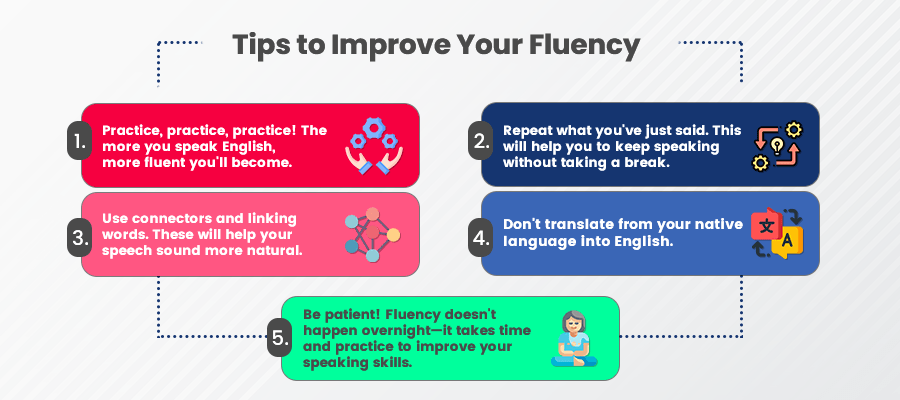
Do you need to improve your fluency for the IELTS Speaking Test? If so, don’t worry – you’re not alone. Many students struggle with speaking fluently, especially under pressure. But with a little bit of practice and some helpful tips, you can make great strides in improving your fluency.
In this article, we’ll share some tips for improving your fluency, as well as some exercises you can do to practice speaking more fluently. We’ll also provide a few links to other resources that can help you improve your fluency even further. So don’t wait – start practicing today and see how much your fluency improves in no time!
Fluency is key when it comes to the IELTS Speaking test. What does fluency mean? It means being able to speak smoothly and without interruption. It means being able to express your ideas clearly and confidently.
If you want to improve your fluency, you need to practice speaking English as often as possible. You also need to be comfortable with the topic you’re discussing. Make sure you know what you’re going to say before you start speaking.
And finally, relax and enjoy yourself! The more relaxed you are, the easier it will be to speak fluently.
When it comes to the IELTS Speaking test, fluency is key. After all, if you can’t speak fluently, you’re going to have a hard time getting your points across.
That’s why it’s important to focus on improving your fluency before you take the test. There are a few things you can do to help improve your fluency:
If you practice regularly and work on your fluency, you’ll be able to speak English more confidently and fluently in the IELTS Speaking test.

When it comes to the IELTS Speaking Test, fluency is key. You want to be able to speak smoothly and naturally, without stopping for long periods of time. Pronunciation, grammar and vocabulary are all important, but if you can’t speak fluently, all of that is going to be irrelevant.
So how can you improve your fluency? Here are a few tips:
When you’re taking the IELTS Speaking test, it’s important to make sure that your fluency doesn’t suffer. After all, if you can’t speak smoothly and without too much hesitation, you’re going to get marked down.
So, what can you do to make sure your fluency doesn’t suffer? Well, for a start, make sure you avoid these common mistakes:
So how can you improve your fluency for the IELTS Speaking Test? By practicing, of course! Here are five ways to get started:
So, you’re taking the IELTS Speaking Test. Congrats! This is a big step, and we know that you’re probably feeling a little bit anxious. But don’t worry, we’re here to help. In this article, we’re going to share some tips on how to improve your fluency for the test.
First and foremost, it’s important to relax and take your time. Don’t try to rush through your answers—speak slowly and clearly so that the examiner can understand you. Pausing between sentences can also be helpful, as it gives you a chance to gather your thoughts.
Another thing you can do is practice speaking in English as often as possible. The more you use English, the better you’ll become at speaking it fluently. And don’t forget to use correct pronunciation and grammar—these are both essential for scoring high marks in the IELTS Speaking Test.
When it comes to speaking in English, fluency is key. You want to sound smooth and confident, without any pauses or mistakes. If you’re having trouble with your fluency, don’t worry – there are a few things you can do to improve your speaking skills.
First, try to speak in English as often as possible. Practice makes perfect, and the more you speak, the easier it will be to get the hang of it. You can also join a conversation group or take some online English classes to get more practice.
Another way to improve your fluency is to focus on your pronunciation. Make sure you are enunciating clearly and correctly, and practice saying different words and phrases out loud.
Finally, be confident in yourself. Believe that you can do it, and don’t be afraid to make mistakes. The more relaxed and confident you appear, the better you’ll sound. Follow these tips and you’ll be on your way to improving your fluency for the IELTS Speaking Test in no time!